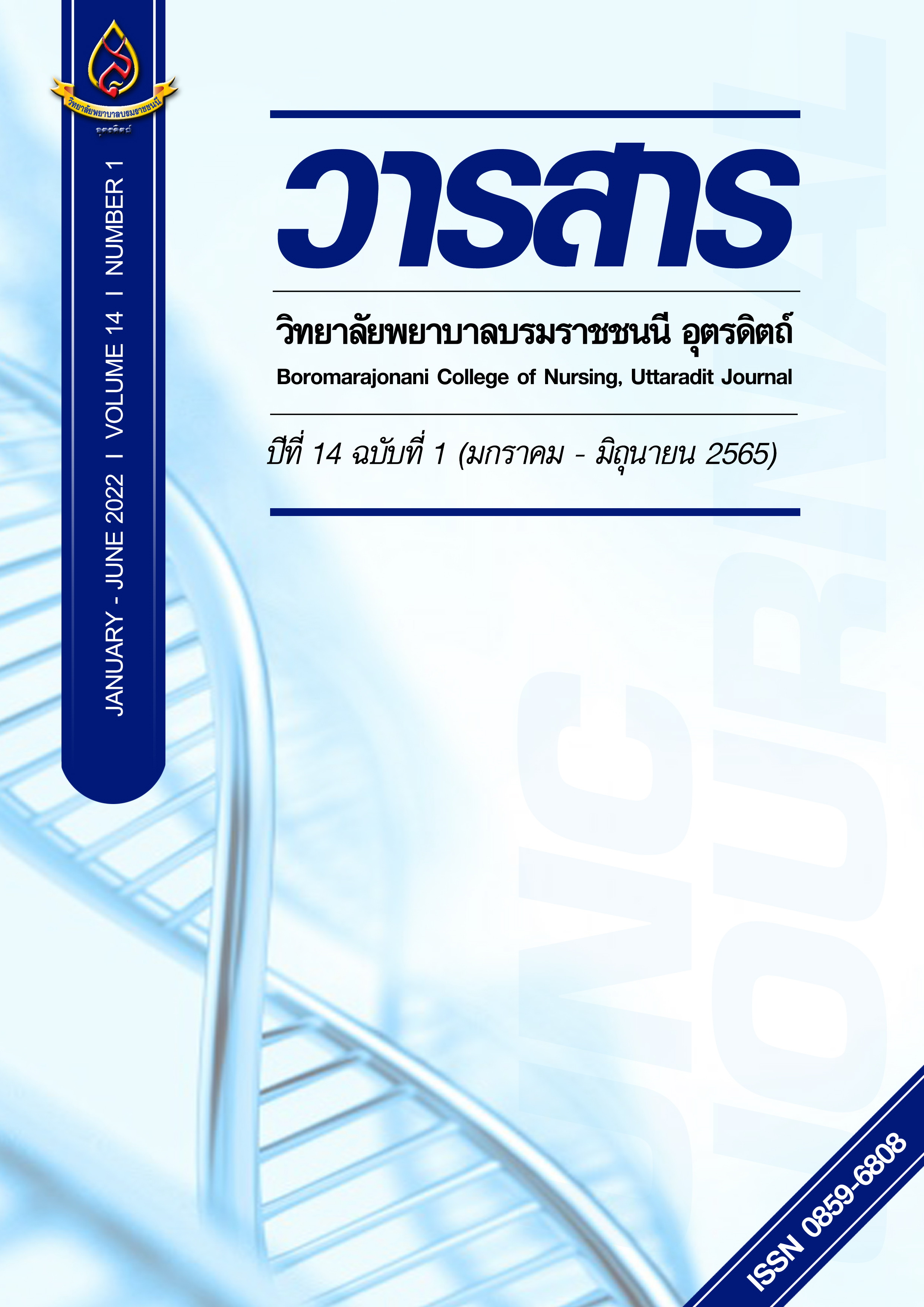การพัฒนารูปแบบการดูแลผู้ป่วยเบาหวานและความดันโลหิตสูง ที่มีภาวะแทรกซ้อนทางไตระยะ 4 เครือข่ายสุขภาพอำเภอควนเนียง จังหวัดสงขลา
Main Article Content
บทคัดย่อ
วิจัยและพัฒนานี้มีวัตถุประสงค์เพื่อศึกษาสภาพการณ์การดูแล พัฒนารูปแบบ และประสิทธิผลของรูปแบบการดูแลผู้ป่วยเบาหวานและความดันโลหิตสูงที่มีภาวะแทรกซ้อนทางไตระยะ 4 เครือข่ายสุขภาพอำเภอควนเนียง จังหวัดสงขลา ระยะดำเนินการมี 3 ขั้นตอน ขั้นตอนที่ 1 ใช้ระเบียบวิธีวิจัยเชิงสำรวจ (Survey research) เพื่อศึกษาสภาพการณ์การดูแลของผู้ป่วยเบาหวาน ความดันโลหิตสูงที่มีภาวะแทรกซ้อนทางไตระยะ 4 จากกลุ่มตัวอย่าง 65 คน ซึ่งเป็นผู้ป่วยเบาหวานและความดันโลหิตสูงที่ได้รับการวินิจฉัยจากแพทย์ว่า เป็นผู้ป่วยที่มีภาวะแทรกซ้อนทางไตระยะ 4 ที่มารับบริการที่ รพ.ควนเนียง อำเภอควนเนียง จังหวัดสงขลา เครื่องมือที่ใช้เป็นแบบสอบถาม วิเคราะห์ข้อมูลโดยใช้สถิติเชิงพรรณนา ขั้นตอนที่ 2 พัฒนารูปแบบการดูแลโดยนำผลการวิจัยในขั้นตอนที่1 และการทบทวนวรรณกรรมยกร่างเป็นรูปแบบการดูแล ผ่านการตรวจสอบจากผู้เชี่ยวชาญ 4 คนซึ่งเป็นทีมสหวิชาชีพที่มีความเชี่ยวชาญเฉพาะสาขาที่ร่วมปฏิบัติงานดูแลผู้ป่วยเบาหวาน ความดันโลหิตสูงที่ได้รับการวินิจฉัยจากแพทย์ว่าเป็นผู้ป่วยที่มีภาวะแทรกซ้อนทางไตระยะ 4 ขั้นตอนที่ 3 ศึกษาประสิทธิผลของรูปแบบการดูแลในการเพิ่มอัตราการกรองของไตและวิธีการปฏิบัติตัวที่ดีเพื่อชะลอไตเสื่อมของผู้ป่วยเบาหวานและความดันโลหิตสูงที่มีภาวะแทรกซ้อนทางไตระยะ 4 ใช้ระเบียบวิธีการวิจัยแบบกึ่งทดลองชนิดหนึ่งกลุ่ม วัดก่อนและหลังการทดลอง กลุ่มตัวอย่างที่ใช้ คือผู้ป่วยเบาหวานและความดันโลหิตสูงที่มีภาวะแทรกซ้อนทางไตระยะ 4 ที่มารับบริการในโรงพยาบาลควนเนียง จังหวัดสงขลา จำนวน 29 คน วิเคราะห์ข้อมูลโดยใช้สถิติเชิงพรรณนา และสถิติ Paired t-test ผลการวิจัยพบว่า
1. ผู้ป่วยเบาหวานและความดันโลหิตสูงที่มีภาวะแทรกซ้อนทางไตระยะ 4 ในโรงพยาบาลควนเนียง จังหวัดสงขลา จำนวน 65 คน เป็นเพศหญิง ร้อยละ 66.00 มีประวัติการเจ็บป่วยด้วยโรคความดันโลหิตสูง ร้อยละ 88.70 โรคเบาหวานร้อยละ 73.60 ไขมันในเลือดสูงร้อยละ 64.20 มีน้ำหนักเฉลี่ย 60.35 กิโลกรัม ระยะเวลาที่มีภาวะแทรกซ้อนทางไตเฉลี่ยที่ 2.54 ปี มีผู้ดูแลเป็นบุตรร้อยละ 62.30 ผู้ป่วยต้องการความช่วยเหลือในการดูแลตนเองด้านอาหาร ร้อยละ 62.30 แนวทางการดูแลผู้ป่วยเบาหวานและความดันโลหิตสูงที่มีภาวะแทรกซ้อนทางไตระยะ 4 ผู้ป่วยจะได้รับการส่งต่อพบแพทย์อายุรกรรมทางไตที่โรงพยาบาล ศูนย์หาดใหญ่ ในผู้ป่วยที่ปฏิเสธการส่งต่อและผู้ป่วยที่แพทย์ส่งกลับมารักษาต่อที่โรงพยาบาลควนเนียงจึงยังไม่มีรูปแบบการดูแลที่ชัดเจน
2. รูปแบบการดูแลผู้ป่วยเบาหวานและความดันโลหิตสูงที่มีภาวะแทรกซ้อนทางไตระยะ 4 (MSES Model) ประกอบด้วย M: Multidisciplinary team (ความร่วมมือของทีมสหวิชาชีพ) S: Self management (การจัดการตนเอง) E: Empowerment (การเสริมสร้างพลังอำนาจ) และ S: Social support (การสนับสนุนทางสังคม)
3. หลังการใช้รูปแบบค่าอัตราการกรองของไตของผู้ป่วยเบาหวานและความดันโลหิตสูงที่มีภาวะแทรกซ้อนทางไตระยะ 4 (X=25.23, SD=5.78) สูงกว่าก่อนการใช้รูปแบบ ( X=22.57 , SD=3.91) อย่างมีนัยสำคัญทางสถิติที่ระดับ .01 โดยมีผู้ป่วยเปลี่ยนมาเป็นระยะ 3 จำนวน 6 คน สำหรับวิธีปฏิบัติที่ดีคือ กลุ่มตัวอย่างได้รับการสนับสนุนการจัดการตนเอง การตั้งเป้าหมาย การสังเกตตนเอง การติดตามตนเอง การแลกเปลี่ยนเรียนรู้กับกลุ่มตัวอย่างด้วยกัน การมาตามนัดต่อเนื่อง ได้รับความรู้เกี่ยวกับการดูแลจัดการตนเองเพื่อชะลอไตเสื่อม ได้รับการดูแลจัดการรายกรณีและคำปรึกษาจากทีมสหวิชาชีพอย่างต่อเนื่อง ทำให้กลุ่มตัวอย่างเกิดความเชื่อมั่นในการตัดสินใจเกี่ยวกับภาวะสุขภาพของตนเอง มีกำลังใจนำไปสู่การจัดการตนเองที่ดีและเหมาะสม
Article Details

อนุญาตภายใต้เงื่อนไข Creative Commons Attribution-NonCommercial-NoDerivatives 4.0 International License.
บทความหรือข้อคิดเห็นใดใดที่ปรากฏในวารสารวิจัยการพยาบาลและวิทยาศาสตร์สุขภาพ เป็นวรรณกรรมของผู้เขียน ซึ่งบรรณาธิการหรือสมาคมศิษย์เก่า ไม่จำเป็นต้องเห็นด้วย และบทความที่ได้รับการตีพิมพ์เผยแพร่ถือเป็นลิขสิทธิ์ของวารสารวิจัยการพยาบาลและวิทยาศาสตร์สุขภาพ
เอกสารอ้างอิง
Allen, D. (2020). Global Facts: About kidney disease. National Kidney Foundation Inc. Retrieved (2020, January 9) from https://www.kidney.org/kidneydisease/global-facts-about-kidney disease.
Chosivasakul, K., Piaseu, N. & Sakdanupab, S. (2017). Effects of a programme integrating multidisciplinary approach and self-management on chronic kidney disease patients with complications. Thai Journal of Nursing Council, 32(4), 79-93. (in Thai).
Chuasuwan A., Lumpaopong A., (2020). Thailand renal replacement therapy year 2020. Retrieved from http://www.nephrothai.org/wp-content/uploads/2021/ Final- TRT-report-2020.pdf. (in Thai).
Cohen, J. (1988). Statistical power analysis for the behavioral sciences. (2nd). NJ: Lawrence Erlbaum Associates, Publishers.
Faul, F., Erdfelder, E., Lang, A. G., & Buchner, A. (2007). G*Power 3: A flexible statistical power analysis program for the social, behavioral, and biomedical sciences. Behavior Research Methods, 39(2), 175-191.
Hair, F. J., Black, C.W., Babin, J.B., & Anderson, E.R. (2010). Multivariate Data Analysis. (7th ed). New Jersey: Pearson Education.
Haileamlak, A. (2018). Chronic kidney disease is on the rise. Ethiopian Journal of Health Sciences, 28(6), 681–682.
Ministry of Public Health. (2564). Service plan response information for NCD DM, HT, CVD branches. Retrieved (2021, March 22) from https://hdcservice. moph.goth. (in Thai).
Juntachat, A., Meepan, M. ,& Jabprapai, P. (2017). The development of the self-management program for diabetes mellitus patients with third stage chronic kidney disease. Journal of Preventive Medicine Association of Thailand, 7(3), 280-291. (in Thai).
KanKarn, W., Damnok, K. & Anutrakulchai, S. (2019). Effectiveness of care model for chronic kidney disease patients using interated disease management and case management in primary care units, northeast. Journal of Nursing and Health Care, 37(3), 173-182. (in Thai).
Lumboot, U., Phinphart, P., Chaisuvannarat, P., Chokchaimadol, J., Janma, J. & Changsirikulchai, S. (2017). Management of the network in CKD care in Pahumthani province. Journal of Medical and Public Health Region 4, 7(1), 17-26. (in Thai).
Nilmanat, K., Thasaneesuwan, S. & Tinkaew, P. (2021). Palliative care for chronic renal failure patients: issues and recommendations for development. Journal of Thailand Nursing and Midwifery Council, 36(4), 5-15. (in Thai).
Pantong, U. (2018). Chronic kidney disease management with chronic care model at primary care in Nakorn si thammarat Province. Maharaj Nakorn Si Thammarat Medical Journal, 1(2), 48–58. (in Thai).
Phinage, C., Suwattanasin, A.,Kongaun, W., Namwong, N. & Rengrila, S. (2020). The development of self management support program for chronic kidney disease patients at pre-dialysis stage. Mahasarakham Hospital Journal, 17(3), 64-75. (in Thai).
Praying, C. (2020). Development of a model for prevention and resolution of chronic kidney disease in Banthi District, Lamphun Province, Thailand. Journal of Health Science, 29(6), 1035-1043. (in Thai).
Puaksawat, P. (2021). Clinical outcomes of a home care case management for patients with chronic kidney disease stage 3. The Southern College Network Journal of Nursing and Public Health, 8(2), 110 –122. (in Thai).
Sabysook, N., Supametaporn, P. & Songthai, N. (2019). The effects of a self-management support program on health behaviors and glomerular filtration rates among type 2 diabetes mellitus patients with stage III chronic kidney disease. Boromarajonani College of Nursing, Uttaradit Journal, 137-150. (in Thai).
Sanee, A. (2014). Self management program in chronic disease. Journal of The Royal Thai Army Nurses, 15(2), 129-134. (in Thai).
Sarajarus, V. & Sumano, A. (2019). Effects of self- management supporting process for slow progression of chronic kidney disease among diabetes mellitus with chronic kidney disease patients at Learn Chabang Hospital, Choburi. Thai Journal of Public Health and Health Sciences, 1(3), 13-26. (in Thai).
Supapan, S. (2019). Development of model to delay renal impairment in patients with diabetes and hypertension using case management process in Phusing Hospial, Sisaket Povince. Journal of Health Science, 28(5), 857–866. (in Thai).
Suparatangool, S. (2018). The family patterns of response to slowing the rate of decline in kidney function in chronic kidney disease patients. Disease Control Journal, 44(1), 92–101. (in Thai).
Teemueangsai, W. & Paksupasin, P. (2021). Development of delayed chronic kidney disease model in primary CKD clinic Mueang District Mahasarakharm Province. Mahasarakham Hospial Jornal, 18(3), 125–135. (in Thai).
Thongtong, S. (2018). Nursing role in supporting self-management of continuous ambulatory peritoneal dialysis patients. Journal of Health Research and Innovation, 1(1), 46-57. (in Thai).
Trisirichok, P., Uttarasart, L. & Kankarn, W. (2019). The impact of self – management support by a multidisciplinary team on delaying chronic kidney disease progression in primary care, Khon kaen Regional Hospital. Srinagarind Medical Journal, 34(6), 552-558. (in Thai).
Varitsakul, R. (2017). Strategies for empowermen in patients with chronic kidney disease. Thai Red Cross Nursing Journal, 10(1), 1-12. (in Thai).
Wongsaree, C. (2018). Factors predicting health self- management in end stage renal disease patient receiving hemodialysis in a private hospital, Thailand. Journal of Nursing Science Chulalongkorn University, 30 (3), 66-77. (in Thai).


